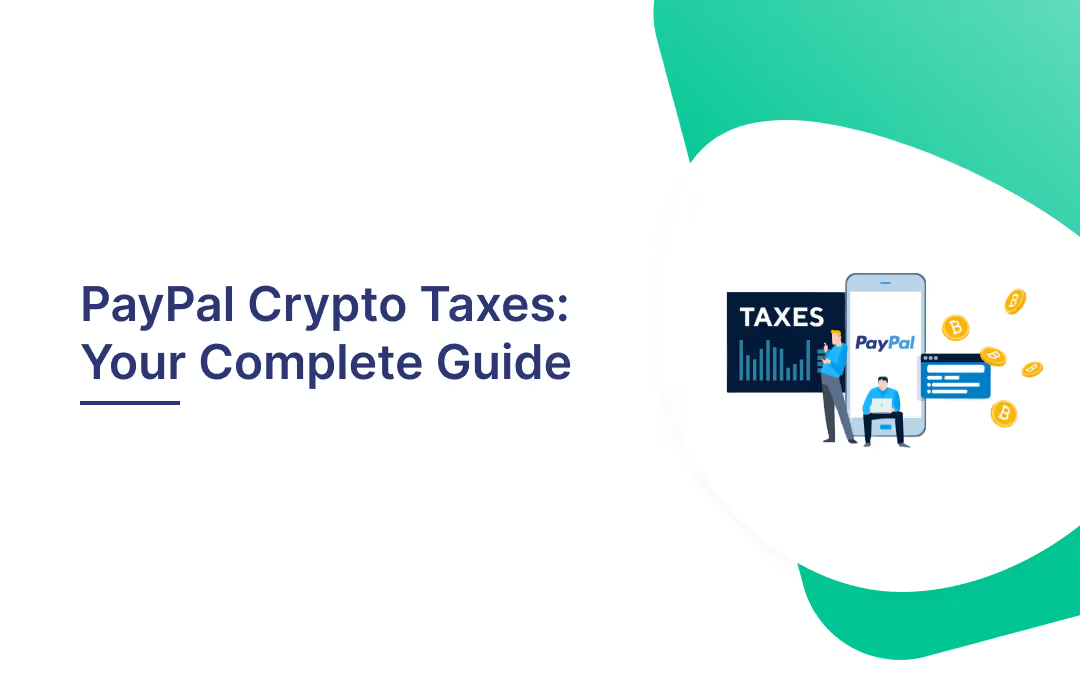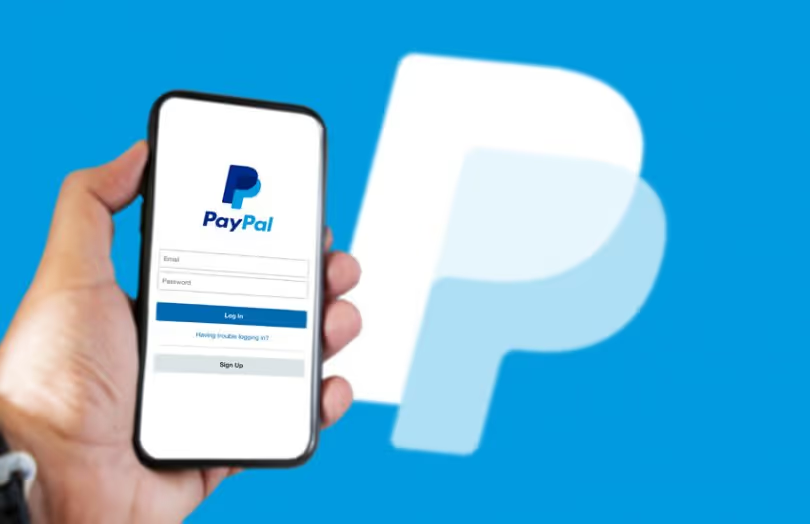.avif)
Calculate Your Crypto
Taxes in Minutes

In 2021, PayPal introduced cryptocurrency support, opening up a world of possibilities for over 346 million active PayPal users. This significant move marked a potential turning point for crypto, as it inched closer to mainstream adoption.
Whether you're a crypto newcomer or an experienced investor, PayPal's crypto wallet offers convenience and accessibility. However, it's crucial not to overlook the tax considerations associated with using PayPal for crypto transactions.
In this comprehensive guide, we dive into everything you need to know about PayPal's crypto wallet, including PayPal crypto taxes.
Exploring the PayPal Crypto Wallet
In October 2021, PayPal made a significant move by introducing the PayPal crypto wallet, a service that enables PayPal customers worldwide to engage in buying, selling, and storing cryptocurrencies.
This innovative offering also allows users to utilize their crypto assets for transactions at any of the 26 million merchants accepting PayPal. Commonly referred to as the PayPal crypto hub, this wallet is currently limited to supporting four specific cryptocurrencies.
While the service is still in its early stages, it showcases the growing adoption of cryptocurrencies within the PayPal ecosystem.
Available Cryptocurrencies for Purchase on PayPal
Currently, there are four cryptocurrencies available for purchase on PayPal:
- Bitcoin
- Ethereum
- Litecoin
- Bitcoin Cash
When the PayPal Crypto Hub was first introduced, purchasing cryptocurrencies through the platform had a limitation: users were unable to transfer their crypto assets to external wallets, setting it apart from other exchanges.
However, PayPal has since introduced the ability to transfer crypto to non-custodial wallets, giving users more control and flexibility over their digital assets. This update addresses the initial restriction and allows PayPal users to securely manage their cryptocurrencies beyond the platform's ecosystem.
Understanding the Fees Associated with Crypto Transactions on PayPal
When using the PayPal Crypto Hub, various fees apply to different transactions. When buying or selling crypto, specific fees are involved. However, when you spend your crypto through PayPal, it automatically converts the crypto into USD at no additional cost, making it a fee-free service.
It's important to note that there are additional transaction fees and limits to consider. Network fees are applicable when transferring crypto to an external address outside of PayPal, although transfers between PayPal accounts are free.

Here are certain transaction limitations to consider:
- Weekly purchase limit: $100,000.00
- Weekly send limit: Cryptocurrency assets totaling the equivalent of $10,000.00
- Minimum send transfer to other crypto wallets: 0.01 BCH, 0.001 BTC, 0.01 ETH, 0.01 LTC.
- Minimum send transfer to other PayPal Crypto Wallets: Cryptocurrency totaling the equivalent of $0.01
.avif)
Being aware of these fees and limits ensures that you have a comprehensive understanding of the costs and restrictions associated with using the PayPal Crypto Hub for your crypto transactions.
PayPal Crypto Taxes: What You Need to Know
When it comes to PayPal crypto taxes, the simplicity of the platform brings some advantages.
The tax treatment for different types of transactions using your PayPal crypto wallet is relatively straightforward:
1. Buying crypto: Tax-free.
2. Holding crypto: Tax-free in most countries, except for some countries with a Wealth Tax that may apply tax to crypto assets held if your total net worth exceeds a certain threshold.
3. Transferring crypto: Tax-free
4. Selling crypto: Subject to Capital Gains Tax.
5. Spending crypto: Also subject to Capital Gains Tax.
The good news is that buying and holding crypto is generally tax-free, depending on your country of residence. However, there are a few countries, such as Spain, the Netherlands, Switzerland, Italy, and France, where holding crypto may be subject to taxation through Wealth Tax.
The only tax you'll typically encounter with PayPal crypto is when you sell your crypto for fiat currency, such as USD, or use it for purchases.
Cryptocurrency is considered a capital asset rather than a currency, making it subject to Capital Gains Tax rules. When you dispose of a capital asset by selling, trading, spending, or gifting it, you'll be liable to pay Capital Gains Tax.
It's important to note that you won't pay Capital Gains Tax on the full amount you received, but only on the perceived capital gain or profit. A capital gain or loss is calculated as the difference in value from the time you acquired the crypto to the time you disposed of it.
For example, let's consider a scenario:
You buy 1 ETH for $4,200 using the PayPal crypto wallet, with $63 (1.50% in fees) included, making your cost basis $4,263.
Later, you sell your 1 ETH on the PayPal crypto hub for $5,000. With another 1.50% ($75) in fees, you add that to your cost basis.
To determine your profit, subtract the cost basis from the sale price: $5,000 - $4,338 = $662.
This $662 is your capital gain, which will be subject to Capital Gains Tax.
The exact amount of Capital Gains Tax you'll pay depends on the duration of your crypto holding period and your regular income level. To learn more about US Capital Gains Tax rates and further details, refer to our comprehensive guide.
Simplifying the Process: How to Report PayPal Crypto Taxes
Once you sell or spend crypto on the PayPal crypto hub, it becomes essential to fulfill your tax obligations by reporting it to the IRS. But how exactly do you report your crypto taxes?
To report your crypto capital gains and losses, you must include them in your Individual Tax Return. The IRS requires you to list each disposal (sale or spend) on Form 8949 and report your net capital gains and losses on Schedule D.
In the past, reporting PayPal crypto taxes was relatively straightforward because your crypto was locked within the platform.
This allowed PayPal to provide users with accurate crypto tax forms containing the necessary calculations and cost basis, which could be easily filed with the IRS. However, the introduction of the ability to transfer crypto to and from your PayPal wallet has brought about some changes.
The inclusion of transfer functionality doesn't necessarily mean that your PayPal crypto tax form will be incorrect. It ultimately depends on whether you have transferred crypto from your PayPal wallet. Let's explore this aspect further to gain a better understanding.
Different PayPal Crypto Tax Forms
When it comes to PayPal crypto taxes, PayPal provides users with crypto tax forms based on their crypto investments. The specific form you need to download depends on whether you have transferred crypto to or from your PayPal crypto wallet.

If you haven't made any transfers to or from your wallet, you can utilize the 1099-K form issued by PayPal. This form includes the correct cost basis and proceeds, and you can access it from the statements and tax center section of your PayPal account.
Typically, if you are eligible to receive a 1099-K form for your PayPal crypto investments, it should be available by the end of January in the subsequent financial year. PayPal uses the HIFO (Highest-In, First-Out) method as the standard approach for calculating gains and losses.
However, if you have conducted transfers involving your PayPal crypto wallet, the process becomes a bit more intricate. Since PayPal cannot track your cost basis in such cases, the information on your 1099-K form may not be accurate.
In this scenario, you can download the Transaction Summary from your PayPal account. This CSV file provides details such as the acquisition or sale date of the cryptocurrency, the quantity of crypto, associated fees, the value, and the transaction ID. This comprehensive summary can be helpful in accurately calculating your crypto taxes.
Streamline Your Crypto Tax Management with Kryptos and PayPal
If you find yourself using multiple exchanges, wallets, and blockchains for your crypto investments, handling crypto tax reporting can become quite complex. However, there's a solution that can simplify the process: Kryptos.

To get started, simply connect your wallets, exchanges, and blockchains to Kryptos through API integration or by importing a CSV file containing your transaction history.
Once linked, Kryptos automatically calculates essential details such as your cost basis, capital gains and losses, crypto income, expenses, and more.
For those who require more comprehensive tax reports, upgrading to an affordable Kryptos plan offers access to various tax report options tailored to your location. These reports include Form 8949 and Schedule D, or other relevant crypto tax forms.
FAQs
1. What info do you need for crypto taxes?
For crypto taxes, you generally need information related to your transactions, such as the date of purchase or sale, the amount of cryptocurrency bought or sold, the price at the time of the transaction, and any fees associated with the transaction. Having detailed records of your crypto transactions will help ensure accurate tax reporting.
2. Does PayPal report crypto basis to IRS?
PayPal has an obligation to report details of certain transactions to the IRS, including those involving cryptocurrency. This might include information on sales and the basis of transactions. Always refer to PayPal's specific guidelines or consult with a tax professional for the most accurate and up-to-date information.
3. Do I have to pay taxes if I receive crypto?
In many jurisdictions, receiving cryptocurrency as a gift, payment for goods or services, or through mining can be a taxable event. The exact tax treatment may vary depending on the circumstances and the jurisdiction you're in, so it's advisable to consult a tax professional or your local tax authority's guidelines.
4. How does the IRS know if I traded crypto?
The IRS can obtain information about your crypto trading activity through various means, such as reporting by exchanges, audits, or information matching. As part of their efforts to ensure compliance with tax laws, they may access data related to your crypto transactions.
5. Do I pay taxes on PayPal crypto?
Yes, transactions involving cryptocurrency on PayPal are generally subject to taxation just like any other crypto transactions. This might include taxes on capital gains or income, depending on the nature of the transaction and the jurisdiction in which you reside. It's essential to keep accurate records and consult with a tax professional to understand your specific tax obligations.
All content on Kryptos serves general informational purposes only. It's not intended to replace any professional advice from licensed accountants, attorneys, or certified financial and tax professionals. The information is completed to the best of our knowledge and we at Kryptos do not claim either correctness or accuracy of the same. Before taking any tax position / stance, you should always consider seeking independent legal, financial, taxation or other advice from the professionals. Kryptos is not liable for any loss caused from the use of, or by placing reliance on, the information on this website. Kryptos disclaims any responsibility for the accuracy or adequacy of any positions taken by you in your tax returns. Thank you for being part of our community, and we're excited to continue guiding you on your crypto journey!
| Step | Form | Purpose | Action |
|---|---|---|---|
| 1 | 1099-DA | Reports digital asset sales or exchanges | Use to fill out Form 8949. |
| 2 | Form 1099-MISC | Reports miscellaneous crypto income | Use to fill out Schedule 1 or C. |
| 3 | Form 8949 | Details individual transactions | List each transaction here. |
| 4 | Schedule D | Summarizes capital gains/losses | Transfer totals from Form 8949. |
| 5 | Schedule 1 | Reports miscellaneous income | Include miscellaneous income (if not self-employment). |
| 6 | Schedule C | Reports self-employment income | Include self-employment income and expenses. |
| 7 | Form W-2 | Reports wages (if paid in Bitcoin) | Include wages in total income. |
| 8 | Form 1040 | Primary tax return | Summarize all income, deductions, and tax owed. |
| Date | Event/Requirement |
|---|---|
| January 1, 2025 | Brokers begin tracking and reporting digital asset transactions. |
| February 2026 | Brokers issue Form 1099-DA for the 2025 tax year to taxpayers. |
| April 15, 2026 | Deadline for taxpayers to file their 2025 tax returns with IRS data. |
| Timeline Event | Description |
|---|---|
| Before January 1, 2025 | Taxpayers must identify wallets and accounts containing digital assets and document unused basis. |
| January 1, 2025 | Snapshot date for confirming remaining digital assets in wallets and accounts. |
| March 2025 | Brokers begin issuing Form 1099-DA, reflecting a wallet-specific basis. |
| Before Filing 2025 Tax Returns | Taxpayers must finalize their Safe Harbor Allocation to ensure compliance and avoid penalties. |
| Feature | Use Case Scenario | Technical Details |
|---|---|---|
| Automated Monitoring of Transactions | Alice uses staking on Ethereum 2.0 and yield farming on Uniswap. Kryptos automates tracking of her staking rewards and LP tokens across platforms. | Integrates with Ethereum and Uniswap APIs for real-time tracking and monitoring of transactions. |
| Comprehensive Data Collection | Bob switches between liquidity pools and staking protocols. Kryptos aggregates all transactions, including historical data. | Pulls and consolidates data from multiple sources and supports historical data imports. |
| Advanced Tax Categorization | Carol earns from staking Polkadot and yield farming on Aave. Kryptos categorizes her rewards as ordinary income and investment income. | Uses jurisdiction-specific rules to categorize rewards and guarantee compliance with local tax regulations. |
| Dynamic FMV Calculation | Dave redeems LP tokens for Ethereum and stablecoins. Kryptos calculates the fair market value (FMV) at redemption and during sales. | Updates FMV based on market data and accurately calculates capital gains for transactions. |
| Handling Complex DeFi Transactions | Eve engages in multi-step DeFi transactions. Kryptos tracks value changes and tax implications throughout these processes. | Manages multi-step transactions, including swaps and staking, for comprehensive tax reporting. |
| Real-Time Alerts and Updates | Frank receives alerts on contemporary tax regulations affecting DeFi. Kryptos keeps him updated on relevant changes in tax laws. | Observe regulatory updates and provide real-time alerts about changes in tax regulations. |
| Seamless Tax Reporting Integration | Grace files taxes using TurboTax. Kryptos integrates with TurboTax to import staking and yield farming data easily. | Direct integration with tax software like TurboTax for smooth data import and multi-jurisdictional reporting. |
| Investor Type | Impact of Crypto Tax Updates 2025 |
|---|---|
| Retail Investors | Standardized crypto reporting regulations make tax filing easier, but increased IRS visibility raises the risk of audits. |
| Traders & HFT Users | To ensure crypto tax compliance, the IRS is increasing its scrutiny and requiring precise cost-basis calculations across several exchanges. |
| Defi & Staking Participants | The regulations for reporting crypto transactions for staking rewards, lending, and governance tokens are unclear, and there is a lack of standardization for decentralized platforms. |
| NFT Creators & Buyers | Confusion over crypto capital gains tax in 2025, including the taxation of NFT flips, royalties, and transactions across several blockchains. |
| Crypto Payments & Businesses | Merchants who take Bitcoin, USDC, and other digital assets must track crypto capital gains for each transaction, which increases crypto tax compliance requirements. |
| Event | Consequences | Penalties |
|---|---|---|
| Reporting Failure | The tax authorities can mark uncontrolled revenues and further investigate. | Penalty fines, interest on unpaid taxes and potential fraud fees if they are deliberately occurring. |
| Misreporting CGT | Misreporting CGT Error reporting profits or losses can trigger the IRS audit. | 20% fine on under -ported zodiac signs, as well as tax and interest. |
| Using decentralized exchanges (DEXs) or mixers without records | The IRS can track anonymous transactions and demand documentation. | Possible tax evasion fee and significant fine. |
| Disregarding Bitcoin mining tax liabilities | Mining reward is considered taxable income, and failure of the report can be regarded as tax fraud. | Further tax obligations, punishment and potential legal steps. |
| Foreign crypto holdings: Non-disclosure | Foreign-accepted crypto FATCA may be subject to reporting rules. | Heavy fines (up to $ 10,000 per fracture) or prosecution for intentional non-transport. |
File Your Crypto Tax in Minutes








